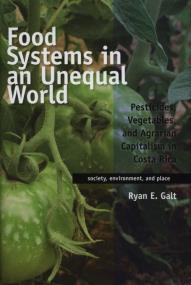Kategorie
|
|

Food Systems in an Unequal WorldNie ma jeszcze oceny, możesz być pierwszym, który ocenił!
autor:
ISBN:
9780816506033
EAN:
9780816506033
oprawa:
Twarda z obwolutą
podtytuł:
Pesticides, Vegetebles and Agrarian Capitalism in Costa Rica
Wydawca:
format:
16.0x23.5cm
język:
angielski
liczba stron:
292
rok wydania:
2014
wysyłka:
niedostępny
176,62
zł
Cena detaliczna:
280,39 zł
Produkt niedostępny
Najniższa cena z ostatnich 30 dni: 175,78 zł
Pesticides, a short-term aid for farmers, can often be harmful, undermining the long-term health of agriculture, ecosystems, and people. The United States and other industrialized countries import food from Costa Rica and other regions. To safeguard the public health, importers now regulate the level and types of pesticides used in the exporters' food production, which creates "regulatory risk" for the export farmers. Although farmers respond to export regulations by trying to avoid illegal pesticide residues, the food produced for their domestic market lacks similar regulation, creating a double standard of pesticide use.
Food Systems in an Unequal World examines the agrochemical-dependent agriculture of Costa Rica and how its uneven regulation in export versus domestic markets affects Costa Rican vegetable farmers. Examining pesticide-dependent vegetable production within two food systems, the author shows that pesticide use is shaped by three main forces: agrarian capitalism, the governance of food systems throughout the commodity chain, and ecological dynamics driving local food production. Those processes produce unequal outcomes that disadvantage less powerful producers who have more limited choices than larger farmers, who usually have access to better growing environments and thereby can reduce pesticide use and production costs.
Despite the rise of alternative food networks, Galt says, persistent problems remain in the conventional food system, including widespread and intensive pesticide use. Facing domestic price squeezes, vegetable farmers in Costa Rica are more likely to supply the national market with produce containing residues of highly toxic pesticides, while using less toxic pesticides on exported vegetables. In seeking solutions, Galt argues for improved governance and research into alternative pest control but emphasizes the process must be rooted in farmers' economic well-being.
Brak recenzjix
Uwaga!!!
Ten produkt jest zapowiedzią. Realizacja Twojego zamówienia ulegnie przez to wydłużeniu do czasu premiery tej pozycji. Czy chcesz dodać ten produkt do koszyka?
TAK
NIE


Wybierz wariant produktu
|
|